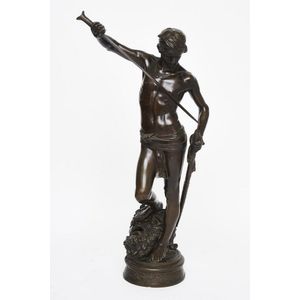Mercier's 'David, Vainqueur de Goliath' Bronze Sculpture
Antonin Mercier (French, 1845-1916) bronze, 'David, Vainqueur de Goliath', late 19th century cast by Barbedienne foundry, the base inscribed 'A. Mercie', with foundry mark 'Barbedienne Fondeur Paris' and the Collas reduction stamp and numbered, height 74 cm. Provenance: Private Collection, Sydney.
You must be a subscriber, and be logged in to view price and dealer details.
Subscribe Now to view actual auction price for this item
When you subscribe, you have the option of setting the currency in which to display prices to $Au, $US, $NZ or Stg.
This item has been sold, and the description, image and price are for reference purposes only.
- Bronze - An alloy of copper and tin, traditionally in the proportions of about 9 parts of copper to 1 part of tin.
The discovery of bronze in Western Asia in the 4th century enabled people to create metal objects which were superior to those previoulsy possible because of its strength and hardness, and it has been used throughout the world for weapons, coins, tools, statuary and other decorative items.
It is very fluid in a molten state, and its hardness, strength when set, and non-corrosive properties makes it most suitable for casting sculpture. - "reduction Mecanique A. Collas Brevete" - "Reduction Mecanique A. Collas Brevete" stamped onto a raised disk on a statue translates as "Mechanical Reduction, A. Collas Patent", referring to the patented method used to reduce the sculptures from their original size. Achille Collas (1795?1859) was a French engineer, inventor, writer and engraver who in 1836 developed a pantograph style machine which enabled him to reduce sculptures to a smaller scale. In 1838, he started a company together with Ferdinand Barbedienne, who was experienced in foundry techniques, to produce reduced copies of sculptures in materials including plaster, wood, bronze and ivory. Following the Great Exhibition of 1851 in London where the company received a special medal, and the Exposition Universelle in Paris when Collas was awarded the Grand Médaille d'Honneur the sculptures became increasingly popular and by 1892 had over 600 employees. The company, Société Collas et Barbedienne continued in production until 1954.
This item has been included into following indexes:
